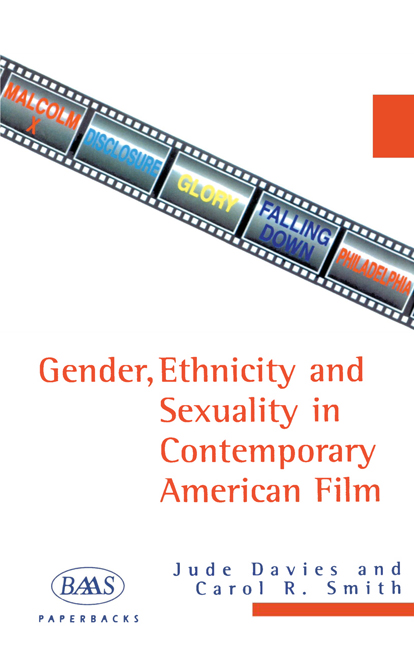Book contents
- Frontmatter
- Contents
- Acknowledgements
- Introduction: The Uses of Identity in Post-Reagan Hollywood Film
- 1 White Masculinity as Paternity: Michael Douglas, Fatherhood and the Uses of the American Family
- 2 Transactions in Race and Ethnicity: Positive, Negative and Interrogative Images of African Americans on Film
- 3 Putting the Homo into America: Reconstructing Gay Identities in the National Frame
- Conclusion: Aliens from Star Wars to Independence Day
- Index
- Miscellaneous Endmatter
1 - White Masculinity as Paternity: Michael Douglas, Fatherhood and the Uses of the American Family
Published online by Cambridge University Press: 24 September 2020
- Frontmatter
- Contents
- Acknowledgements
- Introduction: The Uses of Identity in Post-Reagan Hollywood Film
- 1 White Masculinity as Paternity: Michael Douglas, Fatherhood and the Uses of the American Family
- 2 Transactions in Race and Ethnicity: Positive, Negative and Interrogative Images of African Americans on Film
- 3 Putting the Homo into America: Reconstructing Gay Identities in the National Frame
- Conclusion: Aliens from Star Wars to Independence Day
- Index
- Miscellaneous Endmatter
Summary
[T]he social and economic changes of the past two decades are beginning to call masculinity into question. The masculinity that once believed itself to be at the pinnacle of the natural hierarchy of things is now being slowly exposed for what it is: a subjectivity that is organised within structures of control and authority… For men who were promised recognition and a secure place in the world, there lies ahead a frightening prospect: that masculinity will be shorn of its hierarchical power and will become simply one identity among others.
Rowena Chapman and Jonathan Rutherford, ‘The forward march of men halted’When did I have the power?
Michael Douglas as Tom Sanders in Disclosure (Barry Levinson, 1994)This chapter is not about white males and their cinematic representations, but about white masculinity as an exemplification of constructions of gendered identity. Our project here is twofold. First, the familiar critical operation of unmasking naturalised representations of white masculinity, and second, to indicate and to trace the workings of the variety of codes involved in its construction. This is to say not only that, like all other forms of identity, white masculinity is socially and culturally constructed, but also to emphasise the reciprocal relationship between white masculinity and other codes such as those of class, generation and national identity as well as race, ethnicity and gender. Historically, Hollywood representations of white masculinity have fulfilled two major semiotic functions. They have mediated the particular identities of white male Americans, while also focusing on other cultural and social issues and identities of ostensibly universal or national scope. In great part, this simultaneous rendering of the universalising and the specific has been predicated on (and has in turn reinforced) white patriarchal power, by constructing white masculinity as a kind of default position, ostensibly lacking specificity but defining the universal in the form of the white male. For several decades academic writing on film has played a part in unmasking these strategies. While Laura Mulvey has theorised the ways in which viewing positions that are usually taken for granted are gendered, Richard Dyer has analysed the ways in which classical Hollywood constructs whiteness as racially and ethnically ‘blank’.
- Type
- Chapter
- Information
- Publisher: Edinburgh University PressPrint publication year: 2020



